Weebly – The Easiest Way To Create A Website
Deep edging gives garden beds and tree wells nice definition when it’s done correctly. It often isn’t. Let’s take a look at how it’s done.
Ugly truth
Above I said nice bed definition and I meant it. But the ugly truth is that before municipalities banned cosmetic pesticides, the deep edges served a different purpose. The granular herbicide called Casoron (dichlobenil) is a pre-emergent chemical which, after application, forms a herbicidal vapor barrier where weeds can’t survive. It’s granular which means that it can stick on bed surfaces. When rain arrives, Casoron can run from the beds to lawns and burn them. Thus, the deep edges, to prevent this unwanted, damaging run-off. More on Casoron: casoron_275_pib
One thing you must do
When you deep edge, the spade MUST hit the bed edge at ninety degrees! This is non-negotiable. Late in 2016, while training a new worker to deep edge, I told him to hit it at 90 degrees. To which he replied, “and what if I don’t?” Sadly, he’s no longer employed by our company.
Ninety degree edges give us the desired look. Re-doing badly deep-edged beds is too time consuming. Do it right the first time.
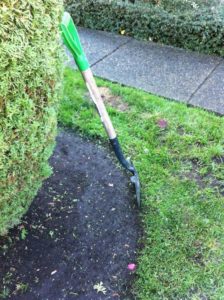
Step two
Place your foot behind the spade before you move any soil. This is a critical step because it prevents rounding off. We want the edge to stay at ninety degrees. Leaning your spade into the edge will round it off. Don’t do it.

Chunks
You will inevitably generate a number of grassy chunks which must be cleaned up. Remember to keep soil away from the bed edges as you clean up. The picture below shows a “finished” bed. The chunks and weeds look hideous and detract from the overall presentation. The bed edge angle looks fine.
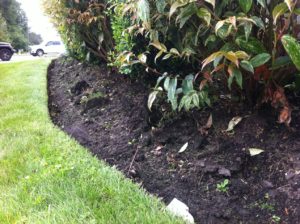
More like this
Remove grassy chunks, beat up soil chunks and cultivate them in, remove weeds and cultivate the entire bed for a nice, clean bed look. Any soil that spills towards the new edge should be pushed back.
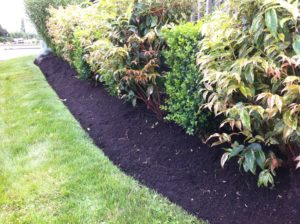
Tree wells
Nice deep edges around tree wells serve the same purpose as bed edges in beds. Plus much more. They help channel water and nutrients to the tree; they also keep competing grasses away. Tree wells also reduce the chances of damaging collisions with lawn equipment. More on that in a future blog post.
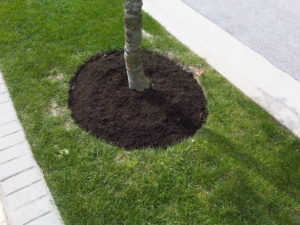
Never let your mowers take liberties with tree wells. Scalping is the ultimate sin in lawn care. In the example below, mowers also crush our deep edges and compact the soil. We can’t tolerate that.
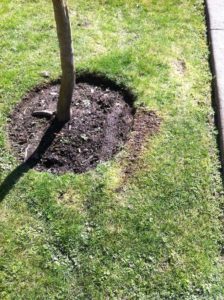
When done correctly to ninety degrees, deep edges give your sites and gardens a sharp look. They should last for months. In the case of tree wells, deep edges serve even a bigger purpose. Give it a try.
Weebly – The Easiest Way To Create A Website

